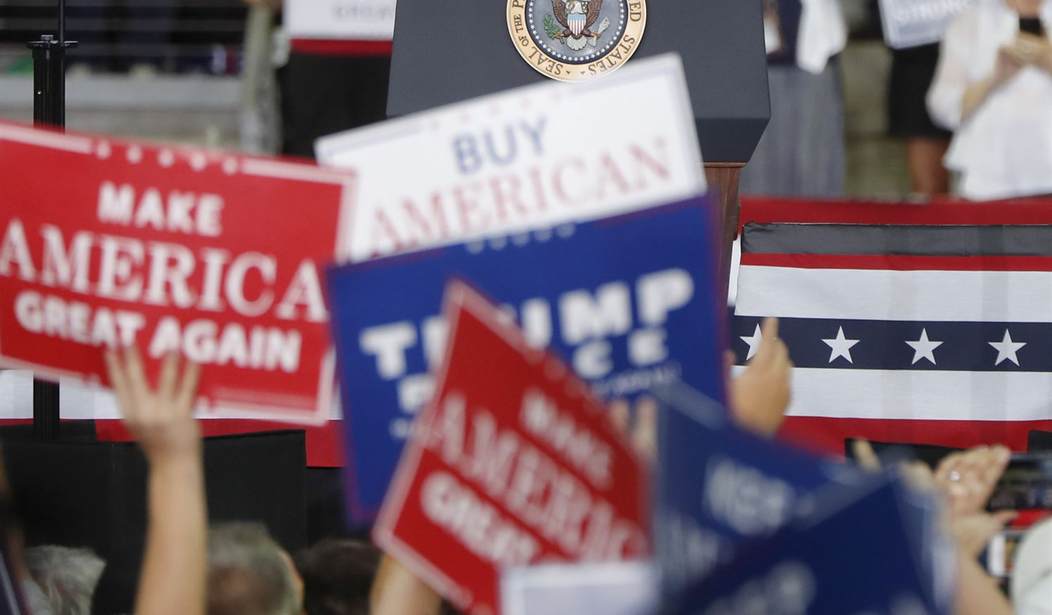ERIE, Pa. -- Jason Vogel is fired up to vote. He says his passion crystallized two weeks ago when he saw just how chaotic Washington, D.C., would be if the Democrats were to seize power in Congress. When Democratic senators smeared Supreme Court nominee Brett Kavanaugh as an attempted rapist without proof and angry protestors stormed the Capitol, he said, he grew increasingly concerned.
"Hard to imagine that occurring every day, but you begin to realize that is exactly what would happen if I didn't turn out to vote," he said.
Vogel is with his family at the Erie Insurance Arena to rally for President Trump and local GOP Congressman Mike Kelly, who is running for re-election. The Vogels are seated far away from the stage, but that doesn't seem to dampen their enthusiasm.
The 40-year-old union steward for the Teamsters Local No. 397 says he became motivated to vote for Kelly when he realized everything important to him is being championed by President Trump and is on Kelly's ballot. "The Second Amendment, trade, job creation and keeping a good economy going -- that comes to a daily fight if the Republicans lose the midterms," he said. "A lot of my friends feel the same way. We ask ourselves, 'Why would you vote Democrat?' Our lives certainly weren't better under their way of doing business."
This November, the question is: What will encourage the conservative populist coalition that put Donald Trump in the White House to vote for Republican candidates -- and help keep their majorities -- in both the House and Senate?
Would it be the president himself?
No.
If you understood what happened at all in 2016, the election was never about him. He didn't cause the coalition to form; he was the result of it.
In an interview with President Donald Trump before his rally in Erie, he readily admitted that his coalition is new, unique and often misconstrued. "It's very interesting, and it's also a very aspiring coalition of people," he said. "They all want to come together."
Recommended
He seemed astounded at the size of the crowd at the sold-out arena. "They say there's 14,000 people outside that can't get in," he noted. "You know, we build screens outside. It's always like that."
He smiled at the suggestion that the supposed blue wave of Democrat voters has lost its force.
"People seem pretty motivated," he said as the roar of the crowd rippled through the stadium.
For the Trump coalition, this election was always going to be about the local issues that hit people where they live. Their suburbs, exurbs, small towns, midsize towns and farming communities have eroded over the past few generations. Trump intuitively knew that, and he knows this is what could galvanize the voters again in the midterms, and maybe match the intensity of Democrats who will come out to vote against him.
Kelly is facing Democrat Ron DiNicola, a Georgetown-educated lawyer who served in the Marines and made a name for himself as a boxer as a young man. RealClearPolitics ranks the outcome of this race as "Likely GOP."
For Amy Westbrook, a Republican who says she's an occasional ticket splitter, voting in the midterms means preserving things that are important to her, like traditional values. "I just heard Mike Kelly for the very first time. I like what I heard," she said.
Standing in the overflow crowd at the rally, Westbrook says she wasn't energized by the Kavanaugh theatrics, though she did scrutinize the hearings. "I really wanted to hear both sides and get to the truth. That was important to me," she said.
She's not always a fan of the president's demeanor, but she is "happy with the results."
If people like Westbrook and Vogel coalesce around the GOP, the Democrats could be in trouble. And if the Democrats keep supporting people who claw at the doors of the Supreme Court in protest, or harass Republicans and their families at dinner, or talk nonstop about impeachment or echo Hillary Clinton's sentiment that "You cannot be civil with a political party that wants to destroy what you stand for," then they may do what I thought unlikely: stop their own blue wave midflow.
It hasn't happened since 1998 when Republicans overreached on impeachment with then-President Bill Clinton, leading to the collapse of their red wave.
At this point, I wouldn't be surprised if history repeated itself.
Salena Zito is a CNN political analyst, and a staff reporter and columnist for the Washington Examiner. She reaches the Everyman and Everywoman through shoe-leather journalism, traveling from Main Street to the beltway and all places in between.

























Join the conversation as a VIP Member